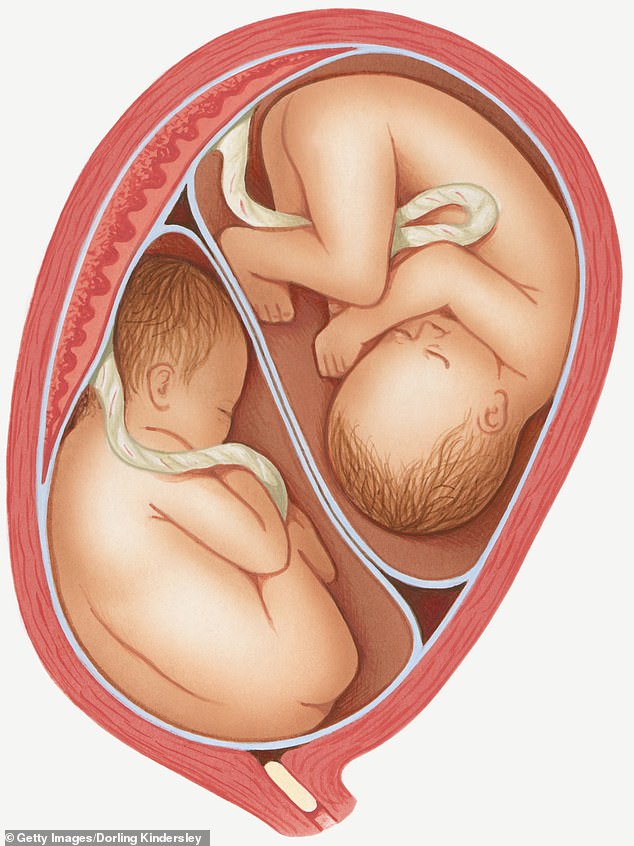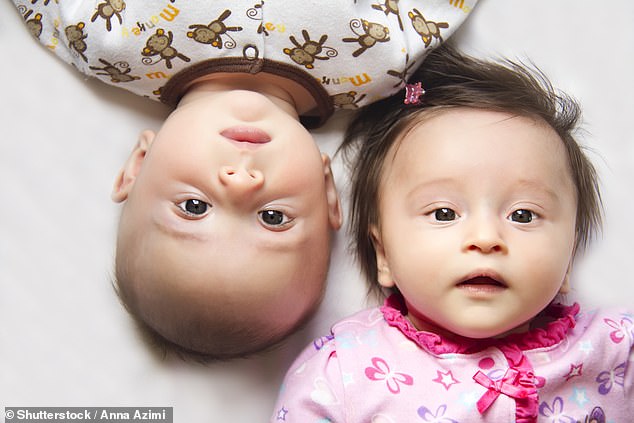Girls with male twins develop ‘masculine’ behavior – because they receive extra testosterone in the womb, research shows
If you are a female twin, your brother may have touched you in the womb.
Scientists have long known that female animals in male-female twin sets get all kinds of funny effects from their male counterparts.
In cows, hormones passed to the female can make them infertile. Research shows that it makes rodents more aggressive.
But some scientists are beginning to identify a similar connection in humans as well.
The effect is said to be related to testosterone, the male sex hormone, which floods the uterus during birth.
Sometimes it flows from the male fetus to the woman and affects the way she grows up, research says.
Studies show that women with male twins exhibit a range of traditionally male behaviors as a result of testosterone exposure in the womb.
“It’s really strange to think that something as random as the person you develop next to in the womb can absolutely change the trajectory of your development and therefore your physiology for your entire life,” said Bryce Ryan, professor of biology at the University of Redlands. told NPR.
Even though twins have their own separate amniotic sacs, which separate them from their brother or sister in the womb, hormones can sometimes flow between them, explains Professor Ryan.
During early development, female embryos do not produce much of the female sex hormone called estrogen. But men start producing testosterone, the male sex hormone, early, Ryan said.
By studying rodents, scientists have found that hormones can sometimes flow between developing twins. This has not been found to produce strange results in male twins, but has been observed to cause some differences in female twins.
A review from 2019 of 60 studies on the subject by researchers from Denmark, America and South Korea concluded that it can influence the behavior and personality of female twins. Specifically, it can increase the likelihood that they will develop traditionally masculine traits.

In the womb, the male sex hormone, testosterone, has been shown to sometimes affect female twins
Female twins had greater risk of developing alcohol use disorders than non-twin females, say University of Missouri psychologists found in a 2013 study.
They also showed more risk-seeking behavior than female identical twins, a trait traditionally associated with boys. Research from 1993 from the University of Pennsylvania reported.
Women of male twins were found to have opinions that were more common in men than in women Research from 1994 from the University of New Orleans and the Queensland Institute of Science.
Unfortunately, there is also evidence that hormonal filtering can have a negative effect on female twins when they reach adulthood.
They are 15 percent less likely to graduate from high school, 6 percent less likely to be fertile and 12 percent less likely to get married than identical female twins, according to a study Study from 2019 from the Norwegian School of Economics, Emory University and Northwestern University.
The 2019 study, published in the journal for the Proceedings of the National Academy of Sciences, looked at 13,800 twins born between 1967 and 1978. The study supports the hypothesis that exposure to male twins in the womb has lasting effects for women.’

Developing in a womb shared with a man could mean that exposure to testosterone causes female fraternal twins to be less fertile, earn less and be at greater risk of dropping out of school
But other researchers are less convinced of this pattern.
a study of the Danish Twin Register in 2000, no physical differences were found in female fraternal twins compared to female identical twins.
“Although we found moderate effects at the national level, these results reflect average differences, and not everyone will be affected in the same way,” said co-author Krzyzstof Karbownik of Emory University.
‘Some female twins may not be affected at all.’
Also, scientists are not sure that the male twin’s hormones are the only thing acting on their uterine mate.
Research into the effect of sex hormones in the womb is complicated by other environmental factors, such as whether or not a mother of twins drank from plastic water bottles during her pregnancy, Professor Ryan said.
Beginning in the early 2000s, public health officials and researchers discovered that a chemical found in plastic water bottles called bisphenol A (BPA) could affect the development of fetuses.
BPA is similar in structure to estrogen, but has a variety of effects on developing bodies, including affecting brain growth, thyroid function and behavioral development, according to the Massachusetts Office of Climate and Environmental Health.
BPA is just one factor that can affect how a fetus, and later a child, develops, Ryan said. That’s one reason it’s difficult to determine how many of a female fraternal twin’s characteristics are caused by her brother, he said.
